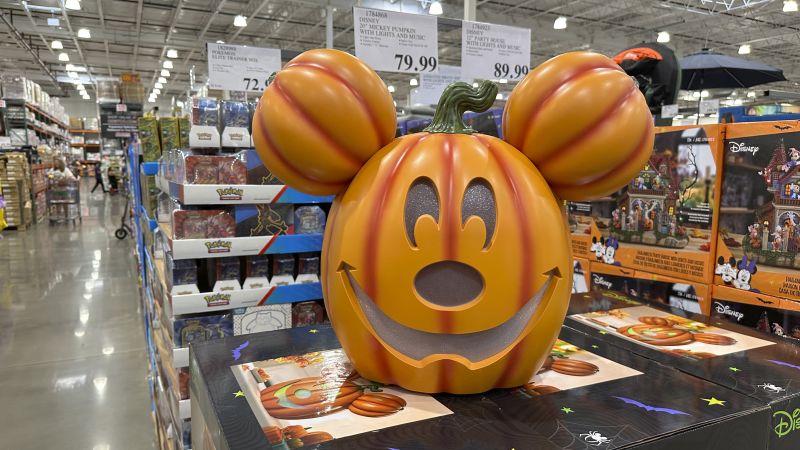The dog days of summer have traditionally been prime time for retailers to stock shelves with folders, lunch boxes and backpacks. But suddenly those items are sharing real estate with skeletons, witches and ghosts.
Coming right on the heels of last year’s Summer Christmas, welcome to Summerween.
Many big-box retailers are getting into spooky season earlier than ever before, and consumers can’t get enough of it.
Popularized by the Disney TV show “Gravity Falls,” TikTok users are showcasing their Summerween parties with watermelon-carved jack-o’-lanterns, coffin-shaped ice cream sandwiches and skeletons propped up on pool floats.
Starbucks jumped on the trend too, releasing its beloved (or hated, depending on the point of view) pumpkin spice latte on Thursday, the earliest it has ever started selling the seasonal beverage.
But all the excitement to get a jump start on Halloween comes as consumers are showing more signs of financial stress. They’re running through their savings and taking on record levels of credit card debt as they contend with high prices and a cooling labor market. As a result, consumers are pulling back on purchases from burgers at McDonald’s to trips to Disney World.
And yet, the tap just keeps flowing and flowing for Halloween, experts say, suggesting consumers have more gas in the tank, at least for some purchases.
“If retailers were worried that, ‘Oh my goodness, this consumer is drying up,’ the last thing they would buy is a bunch of huge pumpkins,” said Laura Champine, senior consumer analyst at Loop Capital Markets. If that were the case, you’d see more retailers pushing consumer staples like trash bags, cleaning supplies and light bulbs, she said.
At the same time, the early Halloween push could be part of a strategy to try to attract more shoppers with the line of thinking that “if they’re not spending in one area, maybe they’ll spend on this,” said Joe Feldman, a senior retail analyst at Telsey Advisory Group.
And throughout the year so far — be it Valentine’s Day, Mother’s Day or July 4th — seasonal goods “have been the one area where people have let themselves splurge a little bit on some discretionary goods,” he told CNN.
“It’s clear that consumers have been interested in buying Halloween products earlier and earlier,” said Champine. A Costco store she visited in Los Angeles started testing out some Halloween merchandise around March. In April, she visited a Costco in New York and saw the same products. “They only rolled it out because it was selling well.” (Costco didn’t respond to CNN’s inquiry.)
Michaels said it started selling Halloween goods in June, the earliest the retailer has ever done so.
“Consumer demand drives the launch of our seasonal collections, and it came earlier than ever this year for Halloween,” John Gehre, chief merchandising officer at Michaels, said in a statement provided to CNN. The initial launch of Halloween goods at Michaels “has been consistently beating our internal expectations,” he added.
It underscores how even though consumers may want to cut back on spending, “in the actual moment, such as when Halloween products are marketing early, they may actually splurge instead,” Kelsey Robinson, a senior partner at McKinsey, said.
Meanwhile, Home Depot’s senior merchant overseeing holiday decor, Lance Allen, said over the last two years the retailer started selling Halloween goods online beginning in April “fueled by high demand.” But in stores, it won’t start stocking Halloween merchandise in stores until around Labor Day “to ensure consistency year after year,” Allen said.
The spooky holiday, a bright spot for home improvement stores like Home Depot and Lowe’s, comes as they’ve been struggling considerably over the past few years following the Covid renovation boom as more people bought homes. Now with elevated mortgage rates and home prices, fewer people are moving. That’s translating into fewer sales.
As a result, these retailers are even more worried about having unsold Halloween items come November that they’ll be forced to mark down, Champine told CNN. By selling Halloween goods earlier, they’re likely hoping it’ll decrease the likelihood of having to discount, she added. Home Depot said its Halloween strategy “has remained the same for the last few years.” Lowe’s declined to comment beyond sharing Google search data for “Halloween.”
Still, just because consumers have increasingly jumped at the opportunity to get an earlier start at Halloween shopping doesn’t mean it’ll stay this way forever, said Feldman.
“At some point, it could snap back.”
Read the full article here




